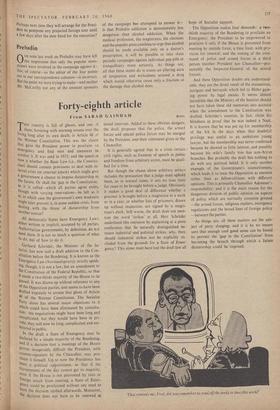Forty-eighth article
From SARAH GAINHAM BONN Ttits country is full of ghosts, and one J them, hovering with warning moans over the living long after its own death, is Article 48 or the Weimar Constitution. This was the clause that gave the President power to proclaim an emergency and find men and measures to combat it. It was used in 1933; and the questima nnw is whether the Basic Law (i.e., the Constitu- tion) should contain provisions to deal with in- ternal crisis (or external attack) which might give a government a chance to impose dictatorship in the future. Or shall the 'gap in the Constitution,' as it is called—which all parties agree exists, though with varying reservations—be left as it is; in which case the government's own weakness might later prevent it, in some sudden crisis, from dealing with the threat of dictatorship from another source?
All democratic States have Emergency Laws, either written or implicit, accepted by all parties. Authoritarian governments, by definition, do not need them. It is not so much a question of what to do, but of how to do it.
Gerhard Schroder, the Minister of the In- terior, has now laid a draft addition to the Con- stitution before the Bundestag. It is known as the Emerge .ncy, Law (Notstandsgesetz); strictly speak- ing, though, it is not a law, but an amendment to the Constitution of the Federal Republic, so that it needs a two-thirds majority of the House to be Passed. It was drawn up without reference to any of the Opposition parties, and seems to have been drafted expressly to arouse that ghost of Article .423 of the Weimar Constitution. The Socialist ratty alone has several major objections to it Which could have been eliminated by consulta- tieo : the negotiations might have been long and complicated, but they would have been in pri- vate; they will now be long, complicated and em- bittered in public. In the draft a State or Emergency may he declared by a simple majority of the Bundestag, and if a decision (not a meeting) of the House proves insuperably difficult the President, with counter-signature by the Chancellor, may pro- claim it himself. Up to now the Presidency has been a political appointment, so that if the Government of the day cannot get its majority, even if the House is not prevented by riots or f°reign attack from meeting, a State of Emer- ,gencY could be proclaimed without any need to nave the decision ratified afterwards. Moreover, the decision does not have to be renewed at stated intervals. Added to these obvious dangers, the draft proposes that the police, the armed forces and special police forces may be merged by the President, and their command given to the Chancellor.
It is generally agreed that in a crisis certain civil rights, such as freedom of speech in public and freedom from arbitrary arrest, must be quali- fied for a time.
But though the clause about arbitrary arreszs includes the precaution that a judge must uphold them, as in normal times, it sets no time limit for cases to be brought before a judge. Obviously it makes a good deal of difference whether a prisoner is brought before a magistrate in a week or in a year, or whether lists of prisoners, drawn up without inspection, are signed by a magis- trate's elerk. Still worse, the draft does not men- tion the word 'strikes' at all. Herr Schroder underlined this omission by explaining at a press conference that lie naturally distinguished be- tween industrial and political strikes; why, then, should industrial strikes not be explicitly ex- cluded from the grounds for a State of Emer- gency? This alone must have lost the draft law all hope of Socialist support.
The Opposition makes four demands: a two- thirds majority of the Bundestag to proclaim an Emergency; the President to be empowered to proclaim it only if the House is prevented from meeting by outside force; a time limit, with pr3- vision for renewal; and the vesting of the com- mand of police and armed forces in a third person (neither President nor Chancellor—pre- sumably the Inspector-General of the armed forces).
And these Opposition doubts are understand- able; they are the direct result of the manceuvres, intrigues and betrayals which led to Hitler gain- ing power by legal means. It seems almost incredible that the Ministry of the Interior should not have taken these old memories into accouat when the amendment to the Constitution was drafted. Schroder's enemies, in fact, claim his blindness as proof that he was indeed a Nazi. It is known that he was put up for membership of the SA in the days when that doubtfal privilege was useful to an ambitious young lawyer, but the membership was never confirmed because he showed so little interest, and possibly because his wife's family tree has non-Aryan branches. But probably the draft has nothing to do with any political belief. It is only another example of the Government's insensitiveness,• which leads it to treat the Opposition as enemies rather than as fellow-citizens with different opinions. This is primarily Chancellor Adenauer':; responsibility; and it is the main reason for the dangerous division of public opinion on aspects of policy which are normally common ground —the armed forces, religious matters; emergency regulations and the broad lines of foreign policy —between the parties.
As things are, all these matters are the sub- ject of party slanging; and it is by no means sure that enough cool good sense can be found to prevent the `gap in the Constitution' from becoming the breach through which a future dictatorship could be imposed.
'That reminds me, Fred, did you, remember to sendoff the pools in time this week?'


































 Previous page
Previous page